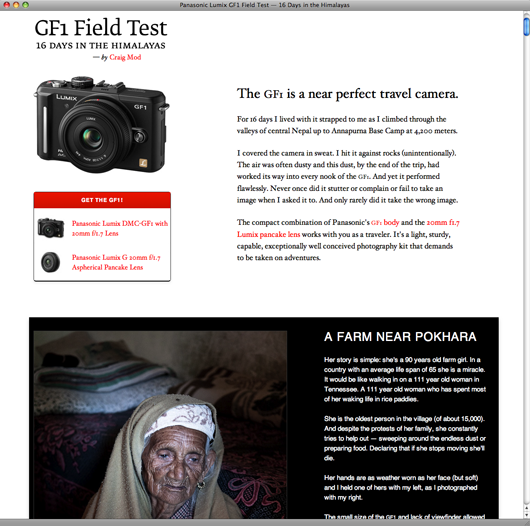Craig Mod writes in:
I took a trip to the Himalayas about 2 months ago and brought a new camera with me.
I had such a blast using the camera I thought it would be fun to review it.
But I wondered why are camera reviews always so clinical? We don’t use cameras in clinical settings.
As an experiment I decided to combine a camera review with a travelogue. After all, we use cameras on the road, not in a laboratory.
I thought you might be interested in the final result.
In hindsight it was an obvious idea but I’ve yet to see anyone else do something like this before.
Neat idea and executed really well. Plus the photos are terrific.


Jorge Galindo
on 23 Dec 09“Why are camera reviews always so clinical?” Because they are intended to be an analysis. I mean: if it’s about buying an electronic gadget, people feels safer with (what they think that are) true and reliable numbers. They also love showing how much do they (apparently) know.
But yes, the result is great, and the author is able to include also relevant data in a comprehensive way.
Dmitry
on 23 Dec 09Jorge: What do you mean by “true and reliable numbers”? The camera won’t be used in a lab environment, it will be used to take real photos. That’s exactly what the travelogue is composed of so it seems to me it’s more “real” than your average camera review.
It’s not just about image quality - it’s about having to take the camera with you everywhere you go, it’s about holding it to take the photo and it’s about pushing the buttons to do so. All of these things are easier in a lab setting - you know exactly what you’re doing. It’s different when you’re using it to take your photos—the photos that matter, the photos you want to turn out well. You get to really feel and experience the product when you use it for yourself, not just to produce some test results.
David Chat
on 23 Dec 09Wow this is great. Love camera reviews like this. When I was looking for a camera I read dpreviews, watched youtube videos, and read an article on the camera I was interested in WSJ. Still wasn’t enough to be me motivated and comfortable to buy such a high price item. No brick and mortar store carried it either.
Then I found a few blogs from professional and amateur photographers that had reviews more like this one. (This blog in particular.) The blog is what got me to buy.
Jacek Becela
on 23 Dec 09They need to be both: clinical and real to be good (and to make me buy things).
Usually the real part is provided by people I know…
Robert Morris
on 23 Dec 09I, too, like reviews that are written in this style. One comment the author made, however, confused me: “And only rarely did it take the wrong image.” Huh? It took a picture of something besides what he was pointing at?
Jamie, Baymard Institute
on 23 Dec 09The reason most camera reviews are so clinical is because they are intended for comparison. If you want to do a fair comparison between two or more cameras (or any other product for that matter) you need to make sure they are evaluated in pretty much identical conditions, which is only achievable in a clinical environment.
I do, however, think we need both. I always go for the clinical reviews on dpreview.com, but then ask friends and read reviews to get the real-life experiences.
George
on 23 Dec 09Great idea. I love the use of the word ‘clinical’. That sounds funny!
And, what better way to test a camera in real life than in the Himalayas!
Jorge Galindo
on 24 Dec 09Dmtry: I think I didn’t make my point clear. Personally, I agree with you. But I was talking about a social phenomenon: costumers who are looking for info about a gadget feel or think that the information is better if it’s put on numbers. Data gives a sensation of accuracy and non-subjectivity to the reader. Of course it’s partly, and sometimes totally, a false sensation (like the “megapixel trap”). And, as Jamie said, it makes easier to compare, wich is the basic reason for reading gadget reviews before buying.
Anyway, as I said, the review is great, and, if combined with ‘clinical’ data, is engaging, and moving, and useful.
Marko
on 26 Dec 09Nice execution, but nothing new. I’ve seen these kind of reviews many times around (not with such a nice page layout though)... for example, Leica M8 in Iraq – http://bit.ly/4mSP
I agree though that experiencing a camera (or any other product) goes far beyond what goes on in the lab. The lab forces you to measure stuff, so you tend to look at a product as a collection of things you have measured, but some of that often has little value in real world. It makes you miss all the little details that make a workflow pleasant, or painful.
This discussion is closed.